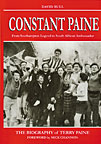 The Biography of Terry Paine
The Biography of Terry Paine
by David Bull
Hagiology, £19.95
Reviewed by Tim Springett
From WSC 267 May 2009
You can’t accuse the author of this excellent tome of not doing his homework, or loving his subject. David Bull, a retired social policy lecturer and lifelong Southampton fan, has penned a fully authorised biography of the player he considers to have been the best that he ever saw play for the Saints. Paine was certainly a remarkable player: 713 league appearances for Saints as they rose from the Third Division South to the top flight and remained there for eight seasons tell their own story. Likewise the 19 England caps that he won – the last against Mexico in the 1966 World Cup finals – without having kicked a ball in Division One.
The book was ten years in the writing, while Bull interviewed what seems to be every surviving Southampton player from Paine’s 17 years at The Dell, in addition to several from Winchester City, Hereford United, Cheltenham Town and Coventry City who had also worked with or played alongside him. The result, therefore, is a comprehensive analysis of what made Paine tick, as well as how he made the teams he played for tick. This is partly provided by players such as Mike Channon, whose early career depended on Paine’s intuition and passing ability, and Ron Davies, a free-scoring centre-forward who benefited from Paine’s crossing. But there are also testimonials from opposing players, including Norman Hunter and Jack Charlton, which indicate that there was little to justify Paine’s reputation as a dirty and widely disliked player. Paine’s era was one in which wingers were not only considered fair game for unconstrained thuggery from full-backs, but the idea of a winger being able – or willing – to tackle back was utterly fanciful.
The turning point of Paine’s career – and of the book – is Lawrie McMenemy’s arrival as Saints manager. The club simply wasn’t big enough for both of them – McMenemy had a mandate to make major changes, but in Paine’s mind, many of those changes were not necessary. The tone of the players when discussing Paine’s attitude becomes markedly different from earlier – from being almost unstintingly helpful and encouraging to those progressing through the ranks, Paine is described as less than supportive at this time. It turns out to be a blip – having moved on to Hereford and subsequently, the comments from his young charges revert to being overwhelmingly
positive.
This is particularly evident from the sections devoted to Paine’s sojourn in South Africa, which began in the apartheid era. This could have been a difficult subject for the author to tackle, but Bull wastes no time in pointing out that, in such times, football was viewed there predominantly as a black person’s sport, in contrast to rugby union and cricket. Paine was a force for integration and, as apartheid ended, he became an ambassador for South Africa’s bid to host the 2006 World Cup, alongside the likes of Roger Milla, Abedi Pele and Gary Bailey.
By the end, you know just about every-thing there is to know about Paine the football man, but little about Paine outside of the game, apart from a brief spell as a Conservative councillor in Southampton. This is not a criticism but an indication that Paine keeps his private life out of sight and the author, quite rightly, has shown no desire to intrude. This book is devoid of sensationalism but jam-packed with relevant information. If only every football book was half as good.
Terry Paine is a regular pundit on South African TV, and though I can see how he might annoy viewers with his accent, opinionated demeanour and nasty habit of thinking that all South Africans support England by proxy, he is an excellent analyst with a nice sense of humour. With Gary Bailey, who is also very good, he makes a great team. Some newer pundits have learned well from those two (and a lesser extent ex-West Ham player Eddie Lewis). Former Charlton hero Shaun Bartlett is getting better at the job.
For his influence on South African punditry, Terry Paine is a legend twice over.